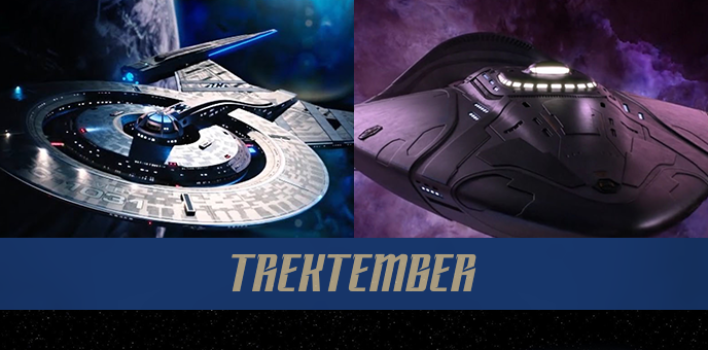Trektember: Season 3 Wrap-Up
Well, that’s it. We did it. Yet again. (Did what? If you missed the entirety of Trektember, click here)
Another Trektember in the can; another one-month mission returning to spacedock for an eleven-month refit. But before we get there—in the last article, we talked about Christ’s sacrifice so that we could remain true to our principles; so that we could survive without sacrificing our identity. But we didn’t talk about what that identity is.
That’s a remarkably vast question, and it took two entire sci-fi shows to answer it. Here’s how each episode answered the question of who we’re supposed to be:
- Greeting us with “The Vulcan Hello,” Mike Poteet shows us that we’re called to be people of vision.
- Amidst the “Battle at the Binary Stars,” David Lichty reminds us of our responsibility to be people of integrity.
- Despite “Old Wounds,” Mark Wingerter reminds us that we’re supposed to be forgivers.
- Insisting that “Context is for Kings,” Alexis Johnson reminds us that we’re made to be discoverers, seeking answers and possibilities.
- In his “Command Performance,” James Harleman explains that we’re called to love and bear with one another.
- “The Butcher’s Knife Cares Not for the Lamb’s Cry,” but Kevin C. Neece cares that we are supposed to be compassionate and caring.
- Rewatching Star Trek: The Motion Picture, David Lichty urges us to realize that we are created beings, and should act like it.
- Kevin C. Neece shouts “Choose Your Pain,” reminding us that discomfort (and loving others despite that discomfort) is a crucial part of our identity.
- Talking “About a Girl,” Matt McKinney shows how our differences and uniquenesses are created to be expressed and enjoyed by others.
- Crossing over “Lethe,” Mike Poteet explains that we are called to be hopeful amid our hurting.
- “If the Stars Should Appear,” David Atwell says, we would experience wonder and amazement as God called us to!
- Remaining sane despite “Magic to Make the Sanest Man Go Mad,” David Atwell is insistent that we are intended to be known and included in order to grow.
- When he met “Pria,” Reed Lackey reminded us that we were made to be free and yet designed to give Jesus control.
- “Si Vis Pacem, Para Bellum,” perhaps, but David Atwell says we are made to not be fearful; instead, we are made to be in harmony.
- During a mission among the “Krill,” David Lichty reminds us that we’re made to wrestle with difficult moral questions.
- David Lichty also ventures “Into the Forest I Go” to tell us how we’re called to meet people on their level.
- Despite falling under “Majority Rule,” Mark Wingerter explains how we’re made to be in grace-filled community together.
- Adam David Collings reminds us that, “Despite Yourself,” you are called to cultivate the good and fight the monster inside.
- Kevin C. Neece welcomes us “Into the Fold” to tell us about our God-given desire for the family we make.
- “The Wolf Inside” challenges David Atwell to subvert the mirror universe and value others despite the mirror evil.
- Kevin C. Neece dodges “Cupid’s Dagger” for a reminder that we’re meant to love truly, not dehumanize others.
- David Lichty braves “The Wrath of Khan” to insist that we’re called to a real, messy, imperfect life with real consequences.
- Mikey Fissel has only “Vaulting Ambition” to tell us about our nature as created beings.
- Through the “Firestorm,” David Lichty reiterates how we’re made for real community.
- Although “What’s Past is Prologue,” David Lichty also tells us we’re made to be creatures in the moment, but for the future.
- While exploring “New Dimensions,” Mikey Fissel plumbs new depths of understanding for the fact that we’re made to be understood and known.
- Fighting “The War Without, The War Within” is what gives David Lichty a picture of the repentance and forgiveness we’re made to embody.
- Reed Lackey does not participate in “Mad Idolatry,” but does reveal how we’re made for a relationship with someone who has incarnated to show us the truth.
- And David Atwell asks, “Will You Take My Hand?” so that he can lead us to an understanding that, recursively, we’re called to live up to our principles even (especially?) when it’s hard.
We can’t do any of this on our own, of course. But God provides us with an example of how to stick to this identity, to these principles: in the passage referenced during yesterday’s article, we discussed Jesus praying to God. He was pleading for help, for aid. He realized that he was desperately dependent upon God for all these things; and then went to the cross so that we could depend on God, too.
So what’s next?
Trektember will return next year for Season 4 – and it’ll be all-new and just as interesting as before. We’ll be turning the series back to the past to look at old favorites once again, and we look forward to working together on the next mission. In the meantime, check out the archives to catch any episodes you missed this year; or go even deeper to see what Trektember looked like in years past.
Thanks so much for reading Trektember on Reel World Theology. We all hope that you’ve gained something from this perspective, and see Christ more deeply. Live long and prosper!
Special Thanks
An extra-special thanks to the eleven writers who led missions into the worlds of Star Trek: Discovery and The Orville:
Mike Poteet, The Sci-Fi Christian
David Lichty, Redeeming Culture/Reel World Theology
Mark Wingerter, Reel World Theology
Alexis Johnson, Reel World Theology
James Harleman, Cinemagogue/Popcorn Theology
Kevin C. Neece, The Gospel According to Star Trek
Matt McKinney, POS-TOS
Reed Lackey, More Than One Lesson/The Fear of God Podcast
Adam David Collings, AdamDavidCollings.com
Mikey Fissel, Reel World Theology
David Atwell, Redeeming Culture/Reel World Theology
We couldn’t have done it without you.
• • •
Trektember is an annual series about Star Trek; this year, we examined the first seasons of Star Trek: Discovery and The Orville. For more information on this series, click here; or, to read every article from the beginning, click here!







